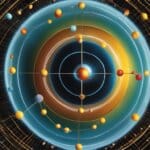Table of Contents
Quantum mechanics is a fascinating branch of physics that delves into the behavior of particles on a subatomic level. It unveils a world of mind-bending concepts and phenomena that challenge our classical understanding of the universe. In this article, we will explore the core principles of quantum mechanics and shed light on the incredible potential it holds for the future.
One of the key principles in quantum mechanics is wave-particle duality, which suggests that quantum objects, such as light and electrons, possess both particle-like properties and wave-like properties. This concept can be observed in everyday phenomena, like the refraction of light through a prism, or in the mesmerizing interference patterns created in the double-slit experiment.
Another fundamental principle in quantum mechanics is superposition, which permits quantum particles to exist in multiple states simultaneously. Unlike classical objects, which have well-defined states, quantum particles can hover in a state of uncertainty until observed, giving rise to the extraordinary concept of being in two or more states at once.
Entanglement is yet another captivating principle of quantum mechanics, where the states of particles become intricately linked, regardless of the distance between them. When two particles are entangled, measuring the state of one particle instantaneously affects the state of the other, no matter how far apart they are. This concept challenges our conventional understanding of communication and opens up extraordinary possibilities.
Superposition: Understanding the Principle
Superposition is a fundamental principle in quantum mechanics that allows quantum objects, such as qubits, to exist in multiple states simultaneously. Unlike classical bits, which can only represent either a 0 or a 1, qubits can be in a superposition of both 0 and 1 at the same time. This unique ability forms the basis of quantum computing and enables the exponential increase in computational power compared to classical computers.
Quantum objects, including qubits, can exist in a superposition of multiple states due to their wave-particle duality. This means that they can exhibit both particle-like properties and wave-like properties simultaneously. The superposition of states allows quantum computers to perform massive parallel calculations, leveraging the power of quantum mechanics to solve complex problems efficiently.
It’s important to note that superposition is not an absolute term and can vary based on the specific application or problem being solved. The size of the superposition is determined by the Hilbert space, which represents all possible states of the quantum system. The larger the Hilbert space, the greater the number of states the quantum object can superpose.
Imagine a quantum object, such as an electron, existing in a superposition of states. In this superposed state, the electron exists in multiple possible positions or energy levels simultaneously. It’s as if the electron is in multiple places at once, spreading out like a wave. This unique property underlies the computational power of quantum computers and has the potential to revolutionize various industries.
Exploring Quantum Superposition: Examples and Implications
To understand the significance of superposition further, let’s explore a few examples and its implications:
- In quantum simulation, superposition allows for the simultaneous exploration of multiple potential solutions to a problem. This can lead to more efficient optimization algorithms and enhanced modeling of complex systems.
- In cryptography, superposition enables a quantum computer to evaluate multiple possibilities simultaneously, enhancing the speed at which cryptographic algorithms can be broken.
- Superposition plays a crucial role in quantum error correction, mitigating the effects of noise and disturbances on qubits, thereby ensuring the reliability and stability of quantum computations.
By harnessing the power of superposition, quantum computing opens up new avenues for solving complex problems and revolutionizing various fields, from optimization and cryptography to drug discovery, materials science, and artificial intelligence.
| Advantages of Superposition | Applications |
|---|---|
| Exponential increase in computational power | Quantum simulation |
| Enhanced speed in cryptographic algorithm analysis | Cryptography |
| Improved stability and reliability of quantum computations | Quantum error correction |
Entanglement: Connecting Quantum Particles
In the fascinating world of quantum mechanics, entanglement is a phenomenon that challenges our classical understanding of communication. It involves the linking of the states of two or more particles, regardless of the distance between them. This entanglement allows for instant communication and influences the state of one particle when the state of another is measured. This remarkable concept has been famously described by Albert Einstein as “spooky action at a distance.”
Entanglement arises through specific processes, such as the emission of particles from the same source or the manipulation of their quantum states. This linking of states creates a unique bond between the entangled particles, enabling them to act as a connected system.
One of the most intriguing aspects of entanglement is its potential for faster communication and computation. As entangled particles instantaneously mirror each other’s state changes, this property holds great promise for developing powerful quantum algorithms and protocols.
The phenomenon of entanglement challenges our classical understanding of communication and opens up new possibilities for quantum computing.
Exploring the implications of entanglement in the context of quantum computing reveals groundbreaking opportunities. By harnessing the power of linked states, researchers and scientists can venture into realms beyond the capabilities of classical computing systems.
In the quest for advancements in quantum computing, entanglement plays a vital role. It offers the potential for faster and more efficient communication, leading to the development of innovative applications and technologies that can reshape the future.
Entanglement: Key Points
- Entanglement is a phenomenon that links the states of quantum particles, enabling instant communication between them.
- It challenges our classical understanding of communication and has important implications for quantum computing.
- Entanglement allows for faster communication and computation, making it crucial for developing powerful quantum algorithms and protocols.
- Entangled particles are created through specific processes, such as emission from the same source or manipulation of their quantum states.
- Exploring the potential of entanglement in quantum computing can lead to groundbreaking advancements and transformative applications.

Quantum Computing Use Cases and Benefits
Quantum computing has the potential to revolutionize various industries and solve complex problems that are beyond the capabilities of classical computers. One of the most promising applications of quantum computing is in the field of cryptography. Quantum algorithms have the ability to break modern cryptographic security protocols, raising implications for national security, cryptocurrencies, and secure online communication.
Another exciting use case for quantum computing is in the realm of drug discovery. Quantum computers can simulate and analyze the behavior of molecules more efficiently than classical computers, enabling faster and more accurate drug development processes.
In the financial industry, quantum computing can be leveraged for complex financial modeling and risk analysis. It has the potential to optimize investment portfolios, improve pricing models, and provide deeper insights into market trends.
Moreover, the combination of quantum computing and artificial intelligence holds tremendous possibilities. By harnessing the power of quantum mechanics, AI algorithms can be significantly accelerated, enabling faster and more efficient machine learning processes.
Finally, quantum computing can make meaningful contributions to energy optimization. By simulating and analyzing the behavior of molecules and materials, quantum computers can help reduce energy consumption and increase overall efficiency, thus paving the way for a more sustainable future.
These are just a few examples of the use cases and benefits that quantum computing brings to the table. With further advancements and research, the potential for quantum computing to revolutionize various industries and drive innovation is truly limitless.
FAQ
What is quantum mechanics?
Quantum mechanics is a branch of physics that deals with the behavior of particles on a subatomic level.
What are the core principles of quantum mechanics?
The core principles of quantum mechanics include wave-particle duality, superposition, and entanglement.
What is wave-particle duality?
Wave-particle duality is the principle that quantum objects have both particle-like properties and wave-like properties.
What is superposition?
Superposition is the principle that quantum objects can exist in multiple states simultaneously.
What is entanglement?
Entanglement is a phenomenon where the states of two or more particles become linked, regardless of the distance between them.
How does superposition benefit quantum computing?
Superposition allows quantum computers to perform many calculations in parallel, exponentially increasing computational power.
What are the potential applications of quantum computing?
Quantum computing has the potential to revolutionize industries such as cryptography, drug discovery, finance, artificial intelligence, and energy optimization.







